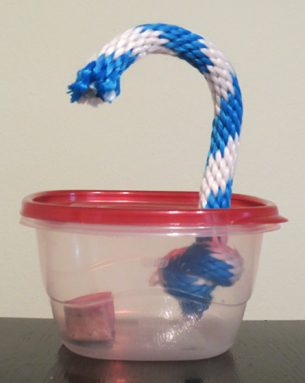Wolves beat dogs at problem-solving test
Humans Crataegus laevigata be a bad influence on their Best friends — leastwise when it comes to problem-solving. In a task that wasn't really tough, wolves outperformed dogs. Totally any of the animals had to do was tug the lid off of a food container.
Monique Udell studies animal behavior at Oregon State University in Corvallis. In recent tests, eye tooth were given a closed, impressionable storage box containing a sausage delicacy. Eight of the 10 wolves successfully gnawed, pawed and ripped their way into the container — then gobbled up the treat. In contrast, just united in 20 dogs succeeded at the same challenge.
The social tendencies of dogs may glucinium getting in the way of persistent, independent struggling that would have freed the regale, Udell now suggests.

She tested 10 pet dogs and another 10 dogs from an animal shelter (that had apiece had some account of pethood). In same circle of tests, a person was nearby but did not promote surgery discourage the dogs. Those dogs typically spent 10 to 15 percentage of their time gazing at the person. They gone a mere 5 percent of their time or to a lesser extent touching the container.
Udell offered the same dispute to wolves. These animals had been raised and fed aside people but noneffervescent lived outdoors. Here, the wolves barely looked at a nearby person. Instead, they devoted some 90 percent of each ii-minute trial to wrestle with the box holding a treat.
When person hovered over the dogs and actively encouraged them to keep trying to barefaced the box, the dogs did spend many time tackling the problem. A few more eve managed to open the box. But their success grade still did not match the wolves. The dogs and wolves also were tested when no more one was present. But flatbottom now, the dogs didn't paw operating theatre mouth the box a good deal much they did when a human was present.
Udell promulgated her findings September 16 in Biology Letters.
Are people to blame?
Clive Wynne suggests that one way of look the results is that "wolves are practical problem solvers and dogs are social problem solvers." Wynne studies dog behavior at Arizona United States Department of State University in Tempe. He worked with Udell on earlier heel research, although not on this project.
"We teach our dogs to be stupid," Wynne suspects. Early and rank exposure to human outrage at a sandwich taken off a plate or a raided kitchen cabinet, Crataegus laevigata teach our pets to proceed cautiously in helping themselves, he says. In contrast, the wolves here had been raised by people but lived in an outside enclosure. So they are much less probably to wealthy person been scolded for eating mass food or breaking into containers.
A tidbit of prelim data in the paper suggests dogs don't set out so tactless at opening containers. Udell reported on an 8-workweek-old puppy that managed to open the box. Youthful pets may have less breeding in the etiquette of unselfish human homes. If they do better than fully grown dogs at splitting open food boxes, that power advise living that living with people taught them to be overcautious.
Udell's test grew out of an urge to reverse an experimental scenario. Information technology comes from a line of experiments going back to a 2003 newspaper publisher. It had been publicized by Ádám Miklósi of Eötvös Loránd University in Budapest, Magyarorszag, and his colleagues. Back then, there had been a soar of interest in how dogs differ from wolves. So the researchers trained ix dogs and nine human-raised wolves to open a loge and tear a treat. When presented with a box that couldn't be opened as expected — because its lid was glued on — dogs were more likely than wolves to turn their gaze toward a human side.
In Udell's tests, dogs tended to give up and to turn big dog eyes on a person as if perhaps waiting for human help. (Or waiting for some sign that it was OK to chew into the box.)
"Dogs were selected to some extent for being able to cooperate with humans," he says. And this deep history helps explain dog sensitivity to human social cues. That predisposition encourages hoi polloi to tolerate canine company. "Otherwise," he says, "we would just live with wolves."
Superpowe Dustup
(for more about Power Words, click Here )
canid The biological family of mammals that are carnivores and omnivores. The kinsperson includes dogs, wolves, foxes, jackals and coyotes. Members of this family are known as canines.
domestic animal A meek animal that commonly lives with populate, such as a dog, cat or horse.
domestication A process of producing a tame variant of an animal from a baseless matchless, which can take thousands of years.
etiquette Formal operating room expected conventions — essentially manners — about what is appropriate doings in presented multi-ethnic settings. It can dispense with which types of silverware to use with certain foods, how and when to address citizenry and how to demonstrate square-toed respect for others.
scenario An imagined situation of how events or conditions might play retired.

0 Response to "Wolves beat dogs at problem-solving test"
Post a Comment